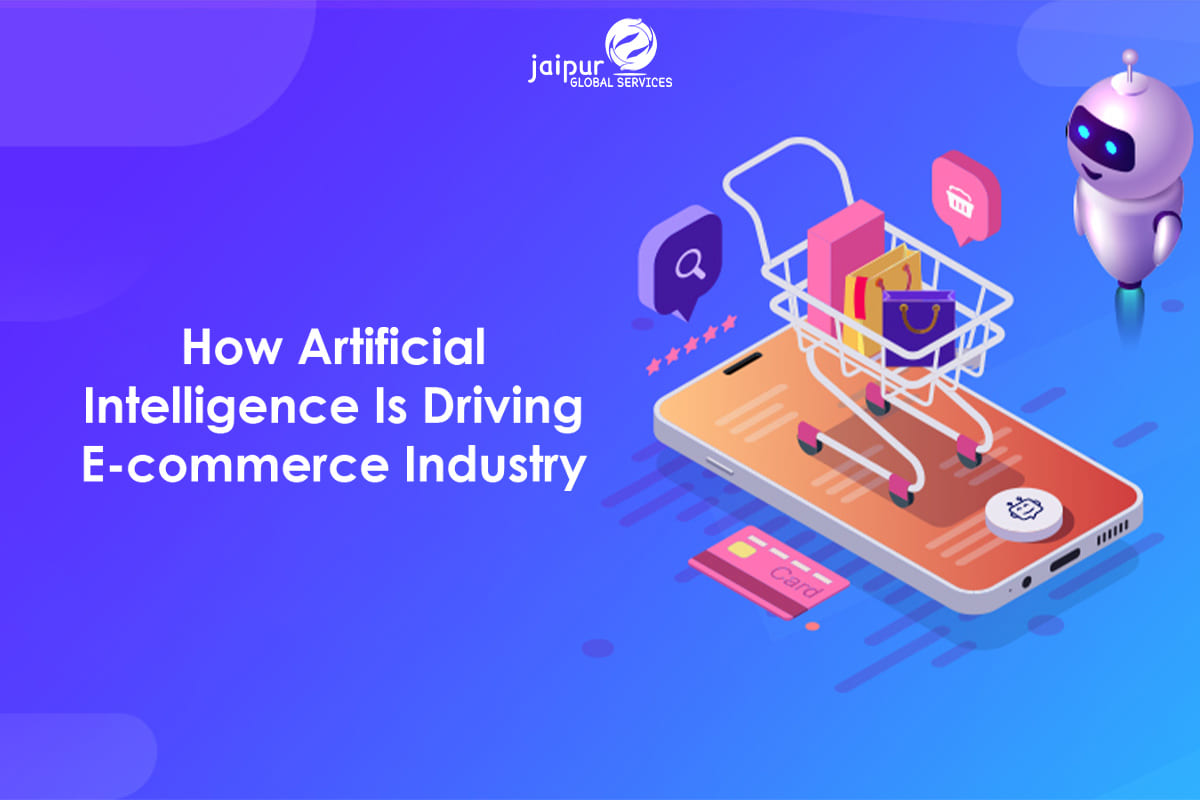
The e-commerce industry has experienced rapid growth in recent years, with online shopping becoming an increasingly popular way for consumers to purchase goods and services. As a result, businesses are constantly seeking ways to improve the customer experience, streamline processes, and increase profitability. Artificial Intelligence (AI) has emerged as a powerful tool to achieve these goals, revolutionizing the e-commerce industry in the process.
Statistics and Facts about AI in E-commerce
AI is experiencing a swift expansion in its application within the e-commerce industry. According to a report by Grand View Research, the global AI in the e-commerce market size is expected to reach USD 19.9 billion by 2027, growing at a CAGR of 43.3% from 2020 to 2027. This growth can be attributed to the increased adoption of AI in e-commerce businesses to improve customer engagement and satisfaction.
Consumers also prefer personalized shopping experiences offered by AI. A survey conducted by Accenture revealed that brands that acknowledge, retain, and present pertinent offers and recommendations are favored by 91% of consumers as potential shopping options.

How AI Is Used in E-commerce to Improve the Customer Experience?
AI is revolutionizing the way that e-commerce businesses operate and interact with their customers. One of the most significant ways that AI is being used in the e-commerce industry is by improving the customer experience. Below are some of the most commonly used features through which AI has transformed the customer experience.

1. Personalized Shopping Experience
AI is being used to provide a personalized shopping experience for customers. By analyzing consumer behavior, preferences, and purchase history, e-commerce businesses can offer tailored recommendations and promotions. This improves the shopping experience for customers and can increase sales for e-commerce businesses.

2. Chatbots and Customer Service
Chatbots offer 24/7 customer service and can handle multiple customer inquiries simultaneously. This provides customers with immediate assistance and improves the overall customer experience. Chatbots can also provide a more personalized experience for customers. By analyzing previous interactions with customers, chatbots can offer tailored recommendations and promotions based on their preferences and behavior.

3. Voice Commerce
AI-powered voice assistants, such as Amazon’s Alexa and Google Assistant, allowing customers to make purchases using their voice. This provides a convenient and hands-free shopping experience for customers.

4. Visual Search
Visual search allows customers to upload a picture of a product and find similar products on an e-commerce website. Visual search is particularly useful for customers who are unsure of the name or brand of a product. It also provides a more engaging and interactive shopping experience for customers.

5. Fraud Detection and Prevention
AI is being used to detect and prevent fraud in the e-commerce industry. Machine learning algorithms can analyze patterns in consumer behavior and identify fraudulent transactions before they occur. This protects both customers and e-commerce businesses from financial loss and improves the overall customer experience.

6. Inventory Management
AI algorithms can analyze sales data, product demand, and supply chain information to optimize inventory management. By predicting product demand, businesses can ensure that they have the right products in stock, reducing the risk of stockouts and overstocking.
Impact of AI on The Supply Chain and Logistics of E-commerce Businesses
The implementation of AI in e-commerce has already resulted in numerous benefits, with logistics and supply chain management being one of the most prominent. AI facilitates the use of critical predictive analytics, particularly in forecasting supply and demand and anticipating supply chain issues. This leads to an increase in supply chain efficiency, which, in turn, keeps costs low and ensures customer satisfaction.
AI also enables more efficient sorting and packaging processes in warehouses and fulfillment centers, resulting in more timely and organized delivery to customers. Furthermore, AI plays a significant role in finding the most efficient delivery routes, helping distributors reach their destinations safely and promptly. By integrating AI into logistics and supply chain management, e-commerce businesses can ensure a better customer experience by providing timely and reliable delivery.
Benefits of AI for E-commerce Businesses
1. Improved Customer Experience: AI can help businesses provide a personalized customer experience by analyzing data to create personalized product recommendations, targeted marketing campaigns, and customized user interfaces. This not only improves customer satisfaction but also leads to increased sales and customer loyalty.
2. Increased Efficiency: AI-powered automation can streamline various processes, including inventory management, order fulfillment, and customer service. This results in reduced operational costs, increased productivity, and faster response times.
3. Enhanced Fraud Detection: AI algorithms can detect fraudulent activities by analyzing patterns in transaction data and customer behavior. This can help businesses prevent financial losses and maintain the trust of their customers.
4. Better Decision Making: AI-powered analytics can provide businesses with valuable insights into their operations, enabling them to make data-driven decisions. This can lead to increased profitability, improved resource allocation, and better supply chain management.
5. Optimized Inventory Management: AI algorithms can analyze data to predict demand and optimize inventory levels, reducing the risk of overstocking or understocking. This results in lower inventory costs and increased profitability.
6. Improved Product Recommendations: AI algorithms can analyze customer data to create personalized product recommendations, leading to increased sales and customer satisfaction.
Challenges and limitations of AI in E-commerce
1. Data Quality: AI algorithms rely on accurate and high-quality data to provide meaningful insights. Poor data quality can result in inaccurate predictions and recommendations, which can harm customer experiences and ultimately impact sales.
2. Implementation Costs: Implementing AI solutions can be costly, especially for small and medium-sized businesses. This can make it difficult for them to compete with larger companies that have greater resources and budgets.
3. Lack of Human Interaction: AI-powered automation can reduce the need for human interaction in certain areas of e-commerce, such as customer service. This can result in a less personalized customer experience, which can impact customer loyalty.
4. Privacy Concerns: AI-powered solutions rely on collecting and analyzing large amounts of customer data. This can raise privacy concerns and lead to potential security breaches if not handled properly.
5. Technical Expertise: Implementing AI solutions requires technical expertise that may not be available within a business. This can result in delays and increased costs as businesses need to outsource the development and implementation of AI solutions.
6. Bias: AI algorithms can be biased towards certain groups or individuals, leading to discriminatory practices. This can harm customer experiences and reputation.
7. Data Quality: AI algorithms rely on accurate and high-quality data to provide meaningful insights. Poor data quality can result in inaccurate predictions and recommendations, which can harm customer experiences and ultimately impact sales.
8. Implementation Costs: Implementing AI solutions can be costly, especially for small and medium-sized businesses. This can make it difficult for them to compete with larger companies that have greater resources and budgets.
9. Lack of Human Interaction: AI-powered automation can reduce the need for human interaction in certain areas of e-commerce, such as customer service. This can result in a less personalized customer experience, which can impact customer loyalty.
10. Privacy Concerns: AI-powered solutions rely on collecting and analyzing large amounts of customer data. This can raise privacy concerns and lead to potential security breaches if not handled properly.
11. Technical Expertise: Implementing AI solutions requires technical expertise that may not be available within a business. This can result in delays and increased costs as businesses need to outsource the development and implementation of AI solutions.
Conclusion:
AI’s significance in E-commerce is on the rise, as it can personalize the shopping experience, optimize pricing strategies, and automate business processes. AI-driven chatbots and virtual assistants can also boost customer service and provide 24/7 support. Besides, AI can help with supply chain management, enable predictive equipment maintenance, and reduce operational costs. Ultimately, AI presents various benefits to E-commerce businesses. To remain competitive in the evolving E-commerce landscape, companies must keep up with the latest AI applications. In summary, AI is a potent tool for enhancing customer experience, optimizing operations, and increasing revenue for E-commerce businesses.

